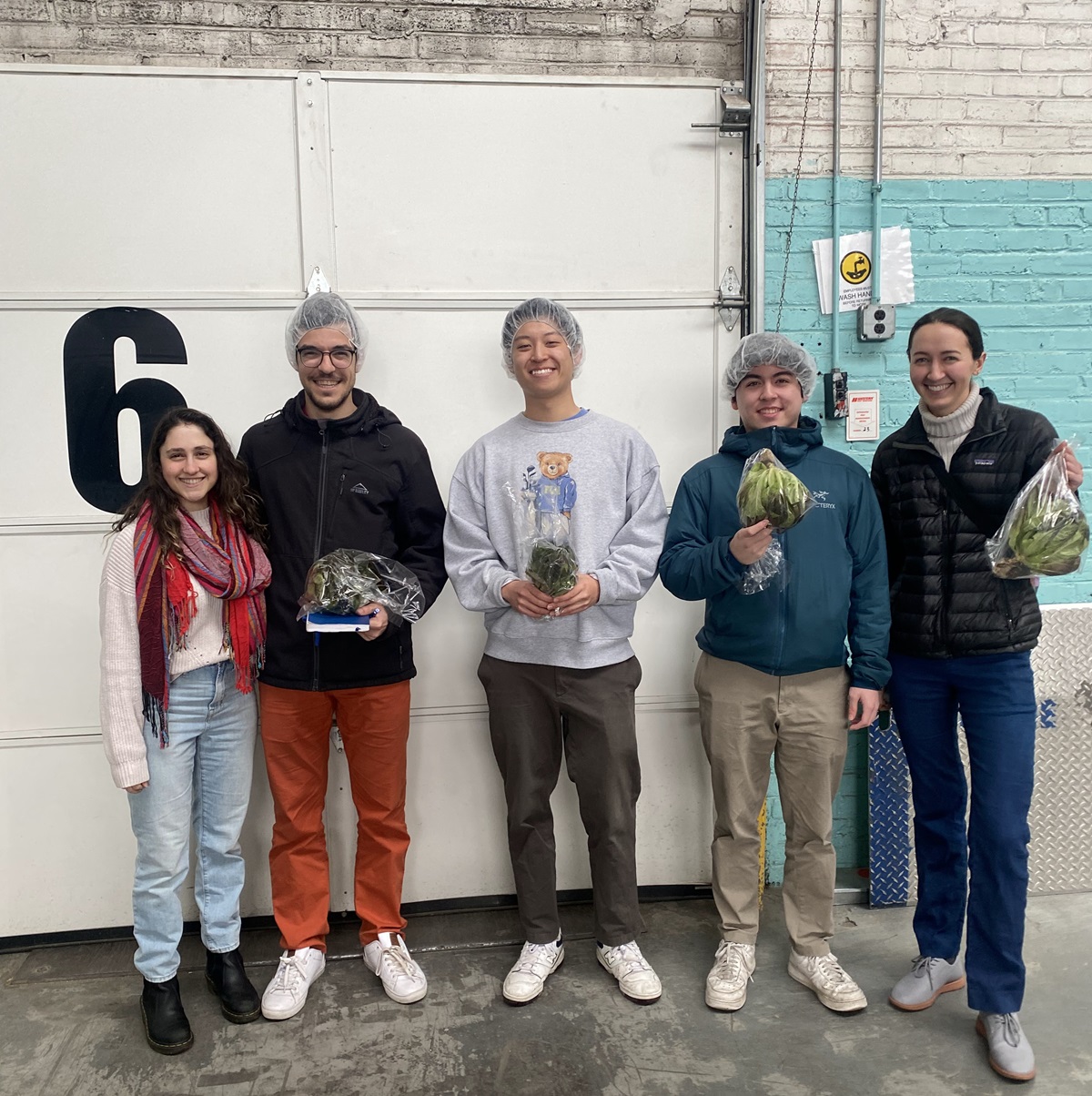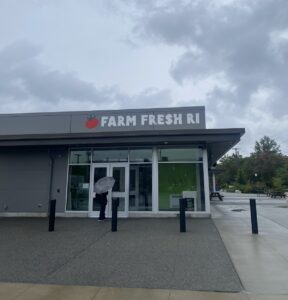A Closer Look at How Food Hubs Build Capacity for Local Food Systems
- by Elise Dudley

Students tour a food hub with Fellow Elise Dudley (far right).
In our previous post about food hubs, we outlined how these third-party aggregators offer a streamlined way to connect local farms with chefs and by extension, further strengthen regional food systems. Below, we share the stories of three food hubs that demonstrate just how critical this model can be for matching supply with demand.
Hudson Harvest: Celebrating New York State Agriculture
In the heart of New York State, Hudson Harvest takes a comprehensive approach to sourcing, growing, and processing local foods. From a livestock program with a sustainable, snout-to-tail ethos to collaborative efforts with local farms and processors, their range of products is as diverse as the state they call home. As state funding for local food in schools has risen, Hudson Harvest has seen a corresponding increase in their partnerships with both public and private institutions. Private universities like Vassar College, served by Bon Appetit Management Company, in Poughkeepsie, New York, have become vital anchors for Hudson Harvest and their network of farms and producers. Chef Manager Edward Rydell at Vassar College emphasized how invaluable this partnership has been. “We’re able to effortlessly access so many local farms through Hudson Harvest,” he says, scrolling through a 15 page-long list of available produce and local foods for the week ahead.
Food hubs like Hudson Harvest are also becoming centers for the processing of B-grade produce into shelf stable goods, such as crushed tomatoes and applesauce, and other light processing or flash freezing of ingredients like butternut squash and corn, that can help sustain high-volume food demands through the academic year when the growing season slows.
Farm Fresh Rhode Island: Cultivating Connections Across New England

Farm Fresh Rhode Island in Providence is a core piece of that state’s food system.
Nestled in Providence is Farm Fresh Rhode Island’s newly constructed community hub for local food. In 2004 a Brown University student posed a simple yet profound question — why is it so difficult for local people to access local food? — and FFRI was born. The nonprofit has since evolved into a comprehensive organization with six diverse food access programs. Back in the early years of FFRI, Executive Chef Jonathan Cambra, now at Roger Williams University, recalls attending initial meetings in the early days. He knew it was the start of “something very special that would make a huge impact within our community,” he says.
Through their simple e-commerce platform, farmers update inventory weekly, set their own prices, and chefs order based on availability. “As a chef, I look forward to the two order days every week – it excites me like a child on Christmas morning… because I know what I’m doing as a chef supports our farmers, friends, and artisans around New England,” explains Jonathan.
In Rhode Island, Brown University and Roger Williams University were some of the first major anchor institutions to participate. For each, partnering with FFRI has become a foundation of their commitment to sourcing locally. As a mission-driven nonprofit food hub, they absorb much of the hefty logistics and distribution costs, allowing farmers to retain a greater share of their profits. They currently work with 250 farms, and their new building is home to everything from a production kitchen that educates youth on transforming B-grade produce into shelf-stable goods to a robust farm-to-school community education program. “All these years later I still have a direct connection with our farmers and have created so many new relationships,” says Jonathan. FFRI is a beaming example of a nonprofit embodying a holistic approach to shaping a more sustainable food system for New England.
The Good Acre: Empowering Small Farms in the Twin Cities
In the Twin Cities and throughout Minnesota, The Good Acre aggregates and distributes produce from over 100 farms to institutional buyers, including Bon Appétit at Macalester College. Beyond wholesale distribution, this nonprofit food hub provides critical support for growers, both technically and financially. Additionally, they offer a CSA program and commercial kitchen space, nurturing local food businesses and fostering economic opportunities for regional farmers.
The overarching goal of The Good Acre is to make local food the default choice by unlocking economic opportunity for farmers through personalized support and market development. On a recent tour led by Hana Tanberg, Facilities Manager, Macalester College students and Bon Appétit Fellow Elise Kulers experienced firsthand how The Good Acre’s commitment to supporting local agriculture goes far beyond the transactional aspect of food distribution.
As demand for local and regional foods continues to grow, food hubs are proliferating. We work with over two dozen food hubs in almost every region of the country, with many longstanding relationships in the mix. You can read about a few of our food hub partners in past stories here, here, and here.
In each of these food hubs, the common thread is a commitment to centering growers and producers in the effort to strengthen local food production. Through streamlined platforms, holistic support for growers, and a shared vision for regional food systems, these hubs are not just transactional intermediaries; but are becoming cornerstones of regional food systems that include institutional purchasing. Across these partnerships, a shift is happening, expending beyond the plate, nurturing diverse local food webs and laying the groundwork for a more sustainable and resilient future.